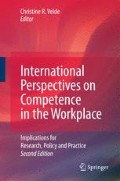Abstract
Experiences of co-operation in higher education between Sweden and Estonia within the framework of European Tempus projects form the basis for a discussion about the need for intercultural communicative competence in working life. Higher education reform in transitional countries is highlighted as part of the efforts to integrate the European education systems into a European higher education area (EHEA). The centralized and indifferent Estonian educational system, typical of the Soviet time, has been restructured, modernized, and democratized, with international co-operation projects playing an important role. The European Tempus Programme offered exchange projects aiming at the introduction of new courses or curriculum revision, university management reforms, as well as links between university as a hub for competence and learning, and public and private organizations. Meanwhile, Estonia has become a full member of the EU (2004), whereas the Tempus Programme continues integrating European countries on the waiting list. Further, 28 neighbouring countries of the Western Balkans, Eastern Europe, Central Asia, North Africa, and the Middle East now have a chance to exchange experiences with academics, experts, and students from 27 EU countries within Tempus projects. Undoubtedly, the extended relations increase the demands for intercultural communicative competence in multi-cultural relations, particularly in working life, where some obstacles are analysed.
Access this chapter
Tax calculation will be finalised at checkout
Purchases are for personal use only
References
ADMIT (Higher education admissions and student mobility within the EU), Literature review, Sweden (1999). London School of Economics and Political Science, London
Allwood J (ed) (1985) Tvärkulturell kommunikation. University of Göteborg, Göteborg
Bauman Z (1995) Postmodern ethics. Blackwell Publishers, Oxford, UK; Cambridge, USA
Bauman Z (1997) Postmodernity and its discontents. Blackwell Publishers, Oxford, UK; Cambridge, USA
Bennett MJ (1986) Towards Ethnorelativism. Cross-cultural orientation. Univ. Press of America, Lanham, New York, London
Bremer L (1997) Central and Eastern Europe and Russia. National policies for the internationalisation of higher education in Europe. National Agency for Higher Education HSV 1997:8 S, Stockholm
Broomé P, Bäcklund A (1998) S-märkt. Företagets etniska vägval. SNS, Stockholm
Daun Å (1984) Swedishness as an obstacle in cross-cultural interaction. In: Ethnologia Europaea, vol. XIV, pp. 95–109, Museum Tusculanum Press, Denmark
Desjardins R, Norelius G, Mendes S (2004) Benchmarking education and training systems in Europe. Studies in comparative and international education, 67. Stockholms universitet. Institutionen för internationell pedagogik, Sweden
Dodd CH (1998) Dynamics of intercultural communication, 5th edn. Brown, Dubuque, Iowa, London
Brunello G, Garibaldi P, Wasmer E (eds) Education and Training in Europe (2007) In: Oxford University Press
Effects of Studies Abroad (1999) Summary. National Agency for Higher Education, Report HSV 1999:10 R, Stockholm
Ericsson E (2009) “Intercultural Competence in EU Training Modules”. Seminar at Lund University, Dept of Education, May 5th, 2000
Evaluation and recognition of foreign higher education qualifications – Principles and methodology (1998) Summary. National Agency for Higher Education, HSV1998:15 R, Stockholm
Fischer P (1998) Baltic membership and migration. Migration and refugee policy on the eastern border of the European Union. Univ. Press, Jyväskylä (Finland)
Hofstede G (1982) Culture’s consequences. Sage, Beverly Hills
Juceviciene P (1995) From pedagogy to educational science, from Western Europe to Lithuania, and from Lithuania to Western Europe. Education in Europe. An intercultural task. Waxmann, Münster, New York
Kälvemark T (1997a) Introduction. National policies for the internationalisation of higher education in Europe. National Agency for Higher Education HSV 1997:8 S, Stockholm
Kälvemark T (1997b) Sweden. National policies for the internationalisation of higher education in Europe. National Agency for Higher Education HSV 1997:8 S, Stockholm
Kants L, Realo A (1999) Meta-level collectivism in Estonia and Finland. Offprint, TRAMES 3(1–2)
Kirch A (2001) What has changed in Estonia since 1988?. CIFEM News, Ausgabe 2
Kreitzberg P (1994) Democratisation of education. Education in a period of social upheaval. Waxmann, Münster, New York
Kreitzberg P (1996) NESA Conference paper
Kreitzberg P, Priimägi S (1998) Educational transition in Estonia, 1987–1996. Education and privatisation in Eastern Europe and the Baltic Republics. Oxford studies in comparative education, vol. 7 (2)
Leetmaa R (2005) Migration patterns in the Baltic sea region. Stockholm, PRAXIS Centre for Policy Studies
Lundberg P (1991) Utbildning och träning för interkulturell kommunikativ kompetens. Studentlitteratur, Lund
Meri R, Vadi M (2005) Estonian culture in the framework of Hofstede’s model (Case of Hotel Industry). TRAMES 3, Tartu University, Tallinn, Estonia
Pajupuu H (1995) Cultural context, dialogue, time. (http://www.eki.ee/teemad/kultuur/context/similar.html)
Pedersen PB (1996) Counselling across cultures, 4th edn. Sages, Thousand Oaks, CA
Priimägi S (1995) Democracy in education. Education in Europe. An intercultural task. Waxmann, Münster, New York
Realo A (1999) Individualism and collectivism: An exploration of individual and cultural differences. Univ. Press, Tartu, Estonia
Re-designing management in the New Europe (1997). European Training Foundation, Torino
Sjögren A (1997) The Swedish school and the challenge of diversity. Language and environment. Multicultural Centre, Botkyrka
Transnational analysis of vocational education and training reforms in Central and Eastern Europe (1998). European Training Foundation, Torino
Van der Wende M (1997) Missing links. National policies for the internationalisation of higher education in Europe. National Agency for Higher Education HSV 1997:8 S, Stockholm
Young R (1996) Intercultural communication. Multilingual Matters Ltd., Clevedon, http://europa.eu.int/comm/enlargement/pas/phare/wip/partners.htm
Zemke U (1998) Student mobility in the European Union as a means of developing cross-cultural capabilities. Multicultural Education, University of Jyväskylä, Jyväskylä
Ziehe T (1989) Kulturanalyser. Stockholm, Stehag, Symposion
Author information
Authors and Affiliations
Corresponding author
Editor information
Editors and Affiliations
Rights and permissions
Copyright information
© 2009 Springer Science+Business Media B.V.
About this chapter
Cite this chapter
Ericsson, E. (2009). Demands for Intercultural Communicative Competence in Working Life. In: Velde, C. (eds) International Perspectives on Competence in the Workplace. Springer, Dordrecht. https://doi.org/10.1007/978-1-4020-8754-7_12
Download citation
DOI: https://doi.org/10.1007/978-1-4020-8754-7_12
Published:
Publisher Name: Springer, Dordrecht
Print ISBN: 978-1-4020-8753-0
Online ISBN: 978-1-4020-8754-7
eBook Packages: Humanities, Social Sciences and LawEducation (R0)

